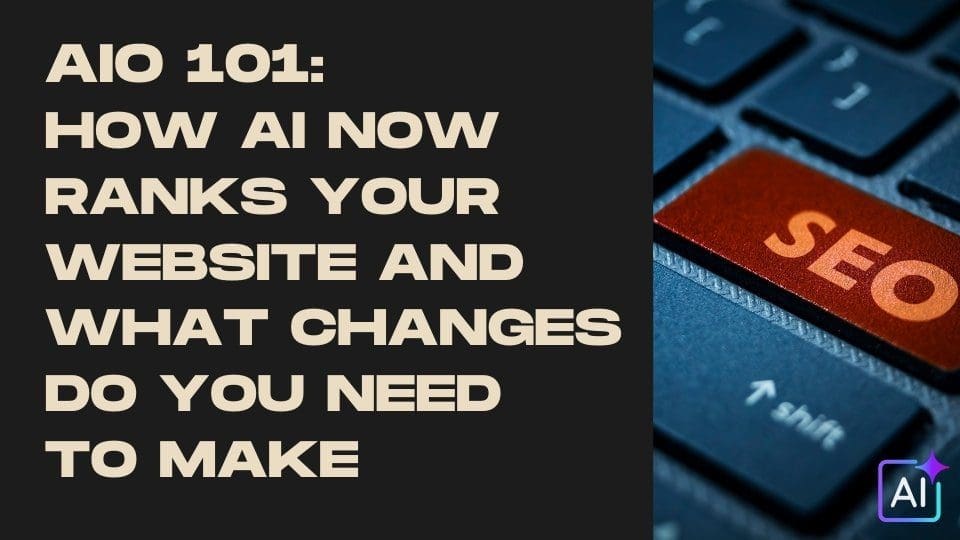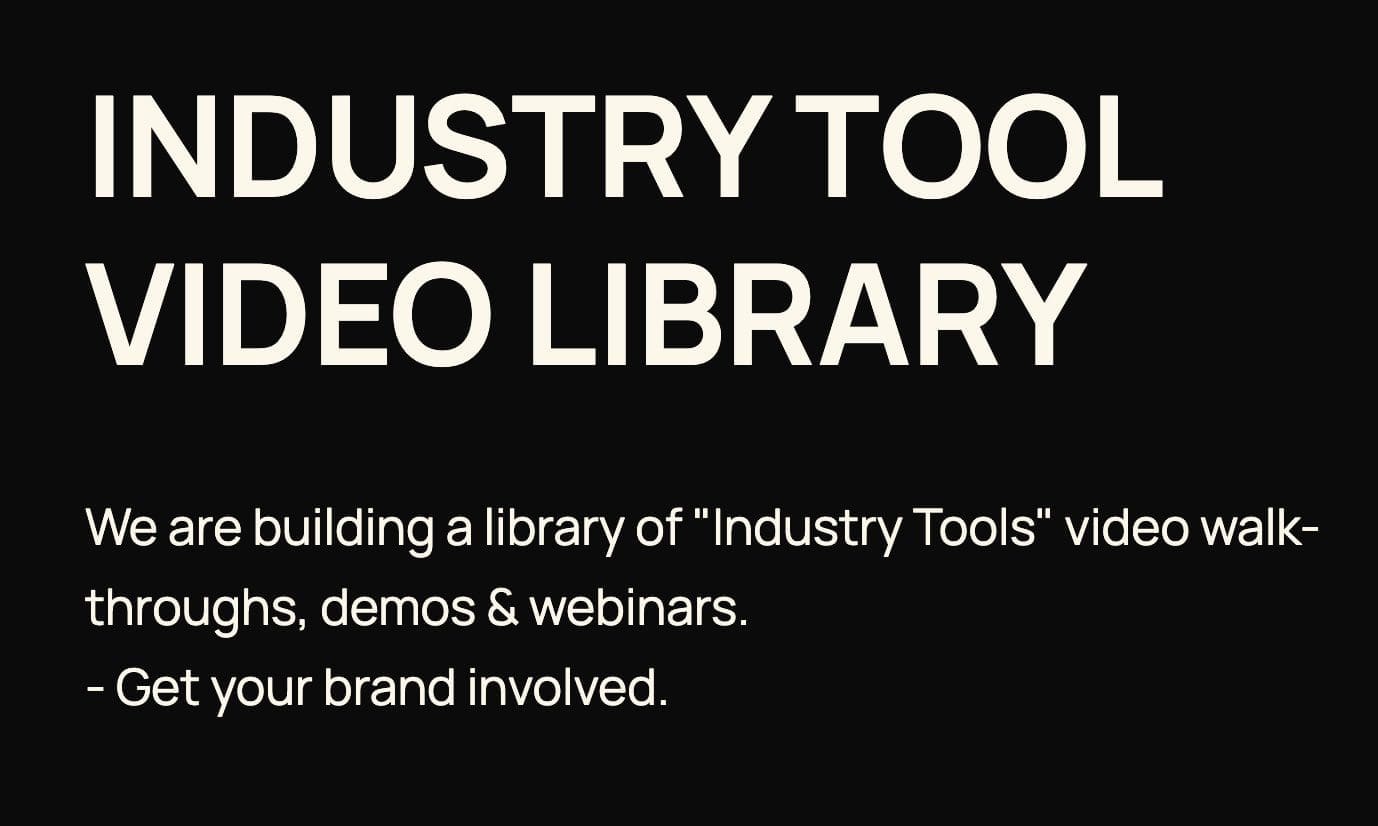AI Learning Centres:
- AI – Learn The Basics
- Get The Most From ChatGPT
- Branding in The Age of AI
- AI for Client Experience
- AI For Prospecting
- AI For Marketing
- AI For Listings & Ads
- Team Adoption of AI
- AI For PM
- AIO & Generative Search
- AI For Operations & Efficiency
- AI For Market Research & Analysis
- AI Ethics, Privacy & Compliance in Real Estate
Digital Marketing & Social Media Learning Centres:
Guides & Downloads

AIO 101: How AI Now Ranks Your Website and what changes do you need to make.
Online search is no longer a list of blue links. Generative engines such as Google’s AI Overviews and Microsoft Copilot read millions of pages, write their own answers, and then cite the sites they trust most.
Your goal is no longer to rank #1—your goal is to be the link the AI quotes.
For real-estate professionals, that means every suburb guide, listing page and blog post must be written—and structured—so an AI system can instantly understand, quote, and credit your expertise.
| Traditional SEO (Past) | AIO – AI Optimisation (Now) |
|---|---|
| Focus on keywords and backlinks | Focus on direct answers and citations |
| Rank position mattered most | Placement inside AI summary matters most |
| Long-form “pillar” content | Concise, structured, expert content |
| Meta-descriptions for clicks | Schema markup for machine reading |
| Traffic measured by sessions | Value measured by referral clicks & brand visibility |
Clear answers first. Pages that answer the core question in the first 1–2 sentences are preferred.
Structured data everywhere. FAQ, How-To and Article schema help AI parse your page.
Balanced, comprehensive coverage. Content that shows multiple viewpoints earns extra trust.
Credible outbound links. Linking to reputable market data (e.g. CoreLogic) signals authority.
Entity consistency. Your agency’s name, address and phone must match across site, Google Business Profile and schema.
Freshness. Market statistics updated monthly surface more often in AI summaries.
User-centred language. Plain English and bullet points improve readability for both people and machines.
Export your top 50 pages (suburb profiles, service pages, market-update articles).
Identify the primary question each page should answer (e.g. “What is the median house price in Paddington?”).
Rewrite the introduction so the first 40 words give a direct, factual answer.
Add a short bullet list summarising key data (prices, rental yield, days-on-market).
Include an expert quote—for example, a principal agent comment—to satisfy “expertise” signals.
Link to two reliable sources (ABS, CoreLogic) to strengthen credibility.
Set a quarterly reminder to refresh statistics and republish the page.
Tip: Use a free AI writing assistant to draft, but always edit for tone and accuracy before publishing.
Install a schema plugin (Yoast SEO, RankMath or Schema-Pro).
Select the correct markup:
FAQ Schema for neighbourhood Q&As.
How-To Schema for “How to prepare your property for sale”.
Article Schema for market reports.
Fill every field—especially author, publish date, address, priceRange.
Validate with Google Rich-Results Test and fix errors immediately.
Re-submit your sitemap in Search Console to trigger faster re-indexing.
Google explicitly states that structured data helps its AI understand and surface your content.(Google for Developers)
Standardise your “About” blurb (agency name, founding year, service area) and reuse it everywhere.
Claim and optimise your Google Business Profile and Bing Places listing.
Create a Wikidata entry for your agency if one does not exist.
Publish authored articles on reputable industry sites; link back to the relevant service or suburb page.
Encourage local media to reference your quarterly market report—each citation boosts authority signals picked up by AI.
Microsoft Copilot also leans on consistent entity data when choosing citations.
Embed suburb-level stats (median price, rental vacancy) in dynamic tables that auto-update from a data feed.
Add short video explainers summarising trends—AI engines increasingly parse video transcripts.
Show on-the-ground photos (cafés, parks) with descriptive alt-text: “Family picnic in Centennial Park, Paddington NSW”.
Answer “people also ask” questions in dedicated FAQ blocks under each page section.
Highlight community projects your agency supports to demonstrate real-world relevance.
Create a “Cited by AI” report in Google Search Console → Performance → Search Appearance → AI Overviews.
Track referral traffic from both Google and Bing; note which pages drive brand impressions even if clicks are low.
Compare before-and-after structured data deployment using index-coverage and impressions over 30 days.
A/B-test lead forms—shorter forms often convert better when traffic arrives directly from an AI answer.
Refine content monthly: merge under-performing pages, expand thin content, and update outdated stats.
Generative Engine Optimisation is iterative; continual tweaks outperform one-off projects.
Keyword stuffing. AI ignores it and may see the page as low quality.
Walls of text. Break content with headings, bullets, tables and images.
Unverifiable claims. Always cite source data.
Old schema formats. Use JSON-LD, not microdata.
Ignoring Bing. Copilot powers Windows 11 and Edge; optimise for both ecosystems.
Week 1: Audit top pages, rewrite intros, add bullet summaries.
Week 2: Implement FAQ/How-To schema on every educational page.
Week 3: Standardise entity information and update all directory listings.
Week 4: Add local-data blocks and refresh images with descriptive alt-text.
Ongoing: Monitor “AI Overview” impressions, refresh stats monthly, and publish at least one expert commentary article every fortnight.
AI ranking rewards clarity, structure and genuine expertise. By answering visitor questions up front, describing your market with data, and marking-up every page so machines can read it instantly, you position your website as the trusted source that generative engines love to cite -and that means more visibility, authority and, ultimately, more listing enquiries.
Author – Ken Hobson.






